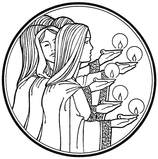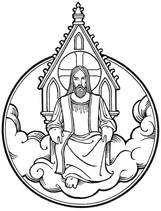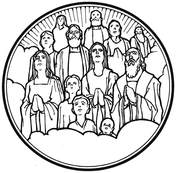
“The day of the Lord will come like a thief in the night” (1 Thessalonians 5:1–11; Second Lesson). The arrival of the bridegroom will be sudden and unexpected. Therefore you are to be watchful and ready like the five wise virgins. “For you know neither the day nor the hour” when the Son of Man is to return. (Matthew 25:1–13, Gospel Lesson). The lamps are the Word of Christ. The oil in the lamps is the Holy Spirit, who works through the Word to create and sustain the flame of faith in Christ. The foolish are those who do not give proper attention to the working of the Holy Spirit in baptism, preaching, and the supper, and so their faith does not endure. The wise, however, are those who diligently attend to these gifts of the Spirit, and who therefore have an abundance of oil. The flame of faith endures to the end. By God’s grace they are received into the eternal wedding feast of the Lamb in His kingdom, the new heavens and the new earth created by the Lord for the joy of His people (Isaiah 65:17–25; First Lesson).
0 Comments

“There, in the clouds of heaven, one like a son of man was coming.” (Dan. 7:13). The Lord Jesus will return in glory on the Last Day with all His holy angels. “All the nations will be gathered in his presence…He will put the sheep on his right and the goats on his left.” (Matt. 25:31–33). Those on His left will be cast into the everlasting fire prepared for the devil and his angels. For they rejected Christ by failing to receive and support His brethren, that is, the preachers of the Gospel. But those on His right will inherit the kingdom prepared for them from the foundation of the world. For they received and supported His brethren and believed what they preached. We believe in the promise of Christ’s coming, even it is delayed because of His long-suffering mercy. Conducting ourselves in godliness, knowing that this fallen creation will soon pass away, we look forward to “new heavens and a new earth, in which righteousness dwells.” (2 Peter 3:13).

You are blessed now with peace and plenty so that you can show the riches of God’s grace to those who are tormented and in need. That’s what Jesus did. Having everything he gave it all up so that you would have everything. And now he blesses you with confidence in the gospel promises on this good day so that you can share those promises with those having a bad day. The same holds for your time and wealth; it is yours to share in humble imitation of what Jesus has shared —no, what Jesus has generously and freely given to you. That’s how we pass the test of sincerity; that’s how invisible faith created by the Word turns into visible works of love for our neighbor.

Last week, on Wednesday, November 1, the Church celebrated All Saints' Day. Today, we observe this feast. To “observe” a feast means we celebrate the feast day in a Divine Service not held on the specific day the feast is celebrated.
The Feast of All Saints’ is the most comprehensive of the days of commemoration, encompassing the entire scope of that great cloud of witnesses with which we are surrounded (Hebrews 12:1). It holds before the eyes of faith that great multitude which no man can number: all the saints of God in Christ––from every nation, race, culture, and language––who have come "out of the great tribulation...who have washed their robes and made them white in the blood of the Lamb" (Revelation 7:9, 14). As such, it sets before us the full height and depth and breadth and length of our dear Lord's gracious salvation (Ephesians 3:17-19). It shares with Easter a celebration of the resurrection, since all those who have died with Christ Jesus have also been raised with Him (Romans 6:3-8). It shares with Pentecost a celebration of the ingathering of the entire Church catholic–in heaven and on earth, in all times and places––in the one Body of Christ, in the unity of the Spirit in the bond of peace. Just as we have all been called to the one hope that belongs to our call, "one Lord, one faith, one baptism, one God and Father of all, who is over all and through all and in all" (Ephesians 4:4-6). And the Feast of All Saints shares with the final Sundays of the Church Year an eschatological focus on the life everlasting and a confession that "the sufferings of this present time are not worth comparing with the glory that is to be revealed to us" (Romans 8:18). In all of these emphases, the purpose of this feast is to fix our eyes upon Jesus, the author and perfecter of our faith, that we might not grow weary or fainthearted (Hebrews 12:2,3).
|
Archives
February 2019
Categories
All
|
||||||||||||||||||||||||

 RSS Feed
RSS Feed
